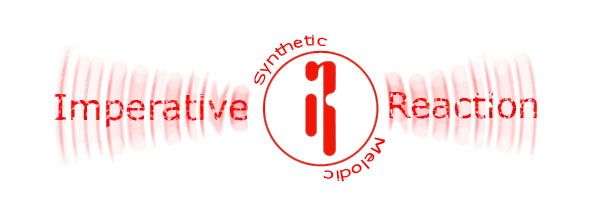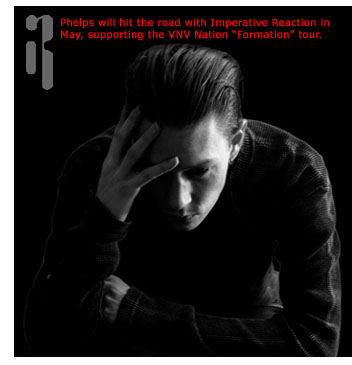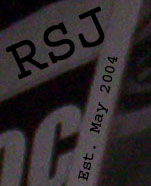|

As it relates to music, the term "art" is often reserved for those working in the experimental realm, those creating
unclassifiable works that defy an easy listening experience. But what about the artistry that goes into writing truly catchy
music? As Ted Phelps found out while creating Imperative Reaction's latest work, the decidedly more melody-based Redemption,
it's often harder to create a song that will get stuck in people's heads than one that will challenge their minds. On the
verge of a US tour with VNV Nation, Phelps speaks with RSJ about Imperative Reaction's synthetic melodies.
Rock Star Journalism: Each of your albums have brought vocals and melody increasingly toward the forefront of the songs. In
what ways do you think your sound has benefited from this progression?
Ted Phelps: I think that the songs are stronger as a result. I've always found it a lot easier to identify with songs
that emphasize the human elements a little more (melody, vocals, etc.). When we did the first album, I never really paid
much attention to this, and I didn't really consider myself a singer. Nowadays, I think differently.
RSJ: You've said that you never want to write the same album twice. In keeping with this, how will your next album be
different from your previous work?
TP: I'm still working on that. Actually in all honesty, I tend to psyche myself out so much over certain things, like
setting out to drastically change the sound, that it causes me to have problems when it comes to writing songs. Right now,
I am simply writing songs for the next album and letting them develop. I really can't say where it will end up at this point.
It will be different from the previous albums though.
RSJ: You've spoken about enjoying working within the verse-chorus-verse song structure. How have you found this to be
beneficial, considering that it's a fairly unusual structure for electronic music?
TP: For me personally, it's much easier to write a ten-minute song with no structure than it is to write a really good
hook. It is more challenging for me to write within a traditional song structure and see what I can do with it. I enjoy
songs that get stuck in my head, so I aim to do that with a lot of my songs. Obviously, that doesn't need to happen with
every single track, but I have always been concerned with how the album sounds as a whole. I don't want to do any "filler"
type tracks.
RSJ: You've mentioned the recording of Ruined as being not the best of experiences. What do you think was the most important
thing you learned from the problems encountered there?
TP: Well, I learned a lot of important things at that time. First off, I realized that I needed to get comfortable doing
everything on my own. Up to that point, I had written half of the music but had Dave Andrecht to do the rest (write the other
half, produce the music, engineer, and create the sounds we used). When it was time to do Ruined, we couldn't really decide
where we wanted to go with it. When we began working on it, Dave had some major life changes to deal with that kind of took
him away from the band. It was really hard to work entirely on my own without someone else to bounce the ideas off of. I
also discovered how important a good work ethic is, as I tended to waste a lot of time when I could have been working on music.
Nowadays, I do everything myself. I have put together a live band that I really enjoy playing with and strangely enough,
a few of the tracks from Ruined are my favorite songs to play live. Ruined, however, will always remain half finished. But
I do feel that I "redeemed" myself with Redemption.
RSJ: Your albums usually seem to have themes running through them; i.e. Ruined seemed to focus on the concept of relationships
falling apart. Would you say there is a common theme to the songs you are currently working on?
TP: At this time I believe so, although it may change. For the first time since Eulogy, I am writing lyrics as I am writing
music and a lot of what I have been writing about seems to be about a person's sense of self and how certain surroundings
can interfere with that. Familiar themes will probably always present themselves in my music but this one seems to be going
in a slightly different direction.
RSJ: Do you have a timeframe for the next album's release yet?
TP: I'd like to say yes, but this year is looking busier by the moment. I originally intended to have it finished by
the end of May but that simply is just not going to happen. I think to be safe, I will say that I now intend to have it finished
by October.

RSJ: Creating an interesting live show seems to be very important to you. What do you think most sets Imperative Reaction
apart as a live band?
TP: I think that we have come a long way since the Ruined tour. I have always believed that the reason rock music has
always gone over better live than most electronic music is due to the energy rock bands have. I don't see a lot of that with
electronic bands. We also play as much as we can live. You will never see us onstage with our keyboards unplugged! The
songs come across harder live, and we do our best to give people their money's worth when they come to see us.
RSJ: Instead of using programmed drums, you have a live drummer when you perform. How do you think this changes the sound
of your music in the live format?
TP: We do have some drums playing in the sequence but the drummer definitely brings a new element to the songs. I can't
believe we ever played without one to tell you the truth. There is an energy that drummers bring that I can't describe.
It just really adds a lot to the music. Not only does it make the show more entertaining for the audience, it makes it a
lot more fun for us to play.
RSJ: Ever thought about releasing a live dvd?
TP: I would love to someday, although we're a long way away from it. Right now, the focus is on the upcoming tour and
the next album.
RSJ: The most recent tour was booked by the band without help from your label. How did that experience turn out? Do
you plan to book the next tour yourselves?
TP: It was a pretty good experience overall. We booked the Ruined tour as well. I've found that it works out very well
when we book the shows and the label promotes them. I had some help for some of the dates, which unfortunately didn't go
so well. I know of agents out there, though, that do a great job with booking tours, so we'll have to wait and see.
RSJ: What has been your biggest learning experience while touring?
TP: It's extremely important to try to maintain good health while out on tour. There were times where I literally didn't
sleep for 2-3 days straight and had to play shows every one of those nights. It definitely takes its toll and every one of
us got pretty sick twice during the tour. I've also learned that when traveling through the Midwest during Tornado season,
it's a good idea to have a weather radio!
RSJ: When do you think you'll be heading out for the next extensive tour?
TP: We will be out again this year in May-June supporting VNV Nation on the Formation U.S. Tour. It will take us all
over North America again and we're really looking forward to this one!
RSJ: Ever since Eulogy For The Sick Child was released in Europe, you've received good press overseas. Why do you think
there is more interest in electronic music outside the US?
TP: You know, the easy answer is that MTV doesn't play it here, but I don't know. Americans like their rock and hip-hop.
I have to say though, the American scene is very big -- it's just a matter of connecting the dots. This country is so big,
it would be pretty impossible to put on a Zillo Festival or a WGT here and have it work. It could be bigger and perhaps it
will gain some momentum amongst those outside of the scene again someday. Who knows?
RSJ: In what ways do you think the European electronic scene differs from the US scene?
TP: It's hard to say, really. I haven't been to Europe in years, but from what I have heard, the scene has been changing
lately. It's much harder to get established over there nowadays. When I was in Europe though, I did notice that electronic
music in general, not just Industrial, is much more popular there. For example, you may very well hear a trance song while
shopping at a department store there, whereas here in America, it seems that most types of electronic music are strictly considered
"dance music" and only played in clubs.
 RSJ: You've mentioned that you like to keep up with what's happening in the current music scene. What kinds of music are
you interested in outside the electronic community?
TP: I like all types of other music, and I do like to keep up with what is going on outside of the genre. Even if most
of it is terrible! I'm really looking forward to the next Nine Inch Nails album, although they are pretty close to the scene
in certain ways. I love the new album by Muse and I think The Killers just put out a really cool album as well. I listen
to everything from The Red Hot Chili Peppers to U2. I think it's important to listen to as much music as I can. They say
that the more you read, the better you are at writing, so I kind of apply that philosophy to what I do.
RSJ: Who do you think is currently doing interesting work within the electronic scene?
TP: Within the genre, I believe that Flesh Field's latest album is great. I really liked the latest A23 album as well.
I'm looking forward to the next Terrorfakt album, especially after hearing his description of it. I think that system syn
is doing some really cool stuff (even if I am a bit partial!). Just heard the clips from the new VNV album, which I think
looks very promising. Babyland's latest album was fucking amazing as well. Along with all of their others of course.
RSJ: You've had your share of problems with previous labels -- I know you've spoken extensively about your problems with
Zoth Ommog. Have you been happy working with Metropolis?
TP: Metropolis has been absolutely amazing for us. They really have gotten behind the band in the last couple of years.
I got to hang out with some of the guys out in Philadelphia when we played there, and they are all really cool people. Dave
Heckman has always been a pleasure to work with as well. They truly are an artist's label in the sense that they allow the
band to put out what it believes is it's best work rather than interfering with the production process.
RSJ: What do you, as an artist, expect from a label?
TP: From an artistic perspective, I expect that the label will allow me the freedom to create and release what I believe
is the best music I can make. From the "being in a band" perspective, I expect that they will promote the album
to the best of their abilities. Meanwhile, I do my part by driving all over the continent playing shows.
RSJ: You've mentioned that you're not the biggest fan of mp3 downloading. How do you think the Internet can be used positively
to benefit bands in need of exposure?
TP: That's a tough one because there are so many bands around; how does one know where to begin? If a person hears about
a band, downloads the mp3 to check it out and then buys the album if they like what they hear, that's cool. If someone's
music is sold through iTunes, I think that helps. But the thing is and always has been, it takes a hell of a lot of hard
work to get any real exposure at all; especially now that the Internet is completely saturated with bands. It's crucial that
a band develops their stage show and gets out and plays. If the opportunity arises, bands need to get out and tour as well.
Once you've done those things, then the Internet begins to work well as a promotional tool.

RSJ: You've done some recent remixing and production work for other bands. Who have you been working with?
TP: System syn, Terrorfakt, Cesium 137, Flesh Field, F38, Autovon, Inure, XP8, IKON and Fake.
RSJ: What do you enjoy about working on other people's music that differs from what you get out of creating your own?
TP: I am able to have a lot more fun because I can be objective. I am a perfectionist, so when I am working on my own
music, the process is much slower because I am constantly second guessing what I am doing. When I work on other people's
music, I'm still a nut about it, but it's not me so I don't have to think in the same terms.
RSJ: Having done remixes for a lot of other people, would you have any interest in an Imperative Reaction remix album?
TP: Actually, yes. In fact, I was considering releasing a remix album a few months ago, but I think I will wait until
after the next album and include remixes of songs from all of our albums.
RSJ: In a previous interview, you talked about working on a side project with Clint Carney and Lisbeth Boada. What's
the status of this project?
TP: I do believe that we will eventually have something to release; it's just going to take some time, as things are very
busy for all of us right now. Clint is working on the next system syn CD, and I am producing that. In addition to that,
I am working on the next Imperative Reaction album along with producing and mastering other bands. Lisbeth is going back
to school. It will happen eventually, and we already have some stuff recorded, but I can't say exactly when we will be releasing
anything.
RSJ: You've said that it has been your goal to create music that could be identified as Imperative Reaction just from
the way it sounds. What do you think are the defining qualities of your music?
TP: I think it's gotten to the point where our style is recognizable -- at least that's what I hope anyway! I think between
the vocals and the way I write, a fan of our music will know it when they hear it.
RSJ: You've also said that you don't want to be easily classified. How do you create music that is identifiable, but
not easily generalized?
TP: That's a good question. Unfortunately, I don't think I have a definitive answer for it. I basically strive to create
music that I would be into. I try to work my influences into my music without being derivative. Ultimately, I am more concerned
with writing good songs and good albums than with being completely experimental. On Redemption, there are definite elements
taken from Futurepop if you will. I happen to like some of the bands that do that type of music, however, I don't think it
would be accurate to call us a Futurepop band. Songs like "Arrogance" are far too hard to be put in that category.
I don't use a lot of heavy distortion on my vocals so I don't think we really fit into the whole "Dark Electro"
scene either. There is definitely a strong rock influence in the music, yet I don't use guitars. Ultimately, I hope as our
style evolves, it remains recognizable as Imperative Reaction.


|

